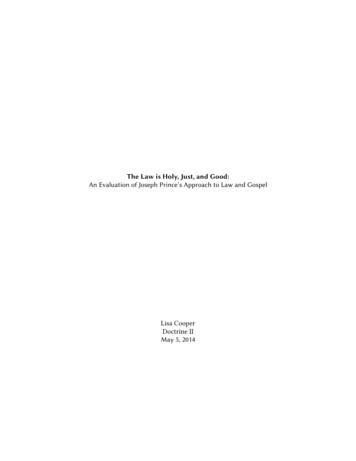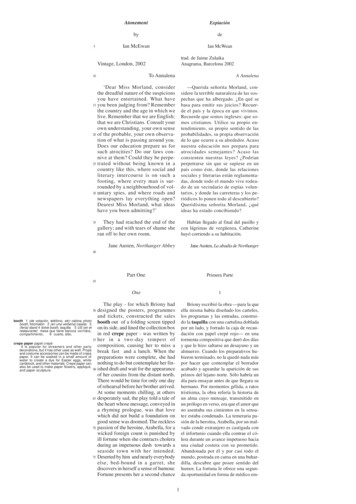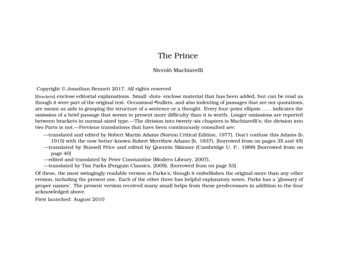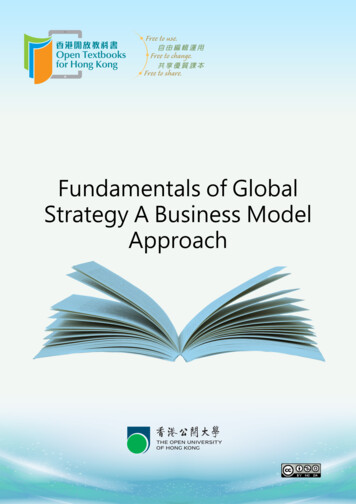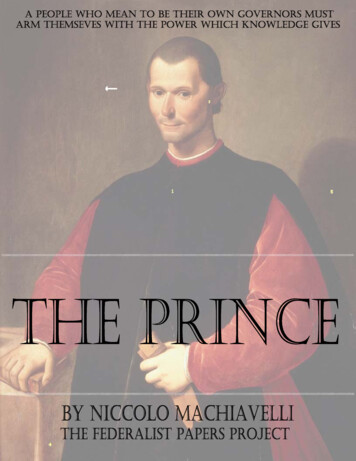
Transcription
THE PRINCEBy Niccolò MachiavelliThe Federalist Papers Projectwww.thefederalistpapers.org
The Prince by Niccolo MachiavelliTABLE OF CONTENTSINTRODUCTION TO THE PRINCE . 4CHAPTER I - HOW MANY KINDS OF PRINCIPALITIES THERE ARE, AND BY WHAT MEANS THEY AREACQUIRED . 6CHAPTER II - CONCERNING HEREDITARY PRINCIPALITIES . 7CHAPTER III - CONCERNING MIXED PRINCIPALITIES . 8CHAPTER IV - WHY THE KINGDOM OF DARIUS, CONQUERED BY ALEXANDER, DID NOT REBEL AGAINSTTHE SUCCESSORS OF ALEXANDER AT HIS DEATH . 13CHAPTER V - CONCERNING THE WAY TO GOVERN CITIES OR PRINCIPALITIES WHICH LIVED UNDER THEIROWN LAWS BEFORE THEY WERE ANNEXED . 15CHAPTER VI - CONCERNING NEW PRINCIPALITIES WHICH ARE ACQUIRED BY ONE'S OWN ARMS ANDABILITY . 16CHAPTER VII - CONCERNING NEW PRINCIPALITIES WHICH ARE ACQUIRED EITHER BY THE ARMS OFOTHERS OR BY GOOD FORTUNE . 18CHAPTER VIII - CONCERNING THOSE WHO HAVE OBTAINED A PRINCIPALITY BY WICKEDNESS. 23CHAPTER IX - CONCERNING A CIVIL PRINCIPALITY . 26CHAPTER X - CONCERNING THE WAY IN WHICH THE STRENGTH OF ALL PRINCIPALITIES OUGHT TO BEMEASURED . 29CHAPTER XI - CONCERNING ECCLESIASTICAL PRINCIPALITIES . 31CHAPTER XII - HOW MANY KINDS OF SOLDIERY THERE ARE, AND CONCERNING MERCENARIES . 33CHAPTER XIII - CONCERNING AUXILIARIES, MIXED SOLDIERY, AND ONE'S OWN . 36CHAPTER XIV - THAT WHICH CONCERNS A PRINCE ON THE SUBJECT OF THE ART OF WAR . 39CHAPTER XV - CONCERNING THINGS FOR WHICH MEN, AND ESPECIALLY PRINCES, ARE PRAISED ORBLAMED . 41CHAPTER XVI - CONCERNING LIBERALITY AND MEANNESS . 42CHAPTER XVII - CONCERNING CRUELTY AND CLEMENCY, AND WHETHER IT IS BETTER TO BE LOVED THANFEARED . 44CHAPTER XVIII - CONCERNING THE WAY IN WHICH PRINCES SHOULD KEEP FAITH . 46CHAPTER XIX - THAT ONE SHOULD AVOID BEING DESPISED AND HATED . 48CHAPTER XX - ARE FORTRESSES, AND MANY OTHER THINGS TO WHICH PRINCES OFTEN RESORT,ADVANTAGEOUS OR HURTFUL? . 54www.thefederalistpapers.orgPage 2
The Prince by Niccolo MachiavelliCHAPTER XXI - HOW A PRINCE SHOULD CONDUCT HIMSELF SO AS TO GAIN RENOWN . 57CHAPTER XXII - CONCERNING THE SECRETARIES OF PRINCES . 60CHAPTER XXIII - HOW FLATTERERS SHOULD BE AVOIDED . 61CHAPTER XXIV - WHY THE PRINCES OF ITALY HAVE LOST THEIR STATES . 63CHAPTER XXV - WHAT FORTUNE CAN EFFECT IN HUMAN AFFAIRS AND HOW TO WITHSTAND HER . 64CHAPTER XXVI - AN EXHORTATION TO LIBERATE ITALY FROM THE BARBARIANS . 67DESCRIPTION OF THE METHODS ADOPTED BY THE DUKE VALENTINO WHEN MURDERING VITELLOZZOVITELLI, OLIVEROTTO DA FERMO, THE SIGNOR PAGOLO, AND THE DUKE DI GRAVINA ORSINI . 70THE LIFE OF CASTRUCCIO CASTRACANI OF LUCCA . 74www.thefederalistpapers.orgPage 3
The Prince by Niccolo MachiavelliINTRODUCTION TO THE PRINCEThe Prince is a political treatise by the Italiandiplomat, historian and political theorist NiccolòMachiavelli.Machiavelli composed The Prince as a practicalguide for ruling (though some scholars argue thatthe book was intended as a satire and essentiallya guide on how not to rule).This goal is evident from the very beginning, thededication of the book to Lorenzo de’ Medici,the ruler of Florence.The Prince is not particularly theoretical orabstract; its prose is simple and its logic straightforward. These traits underscoreMachiavelli’s desire to provide practical, easily understandable advice.The first two chapters describe the book’s scope. The Prince is concerned withautocratic regimes, not with republican regimes. The first chapter defines thevarious types of principalities and princes; in doing so, it constructs an outline forthe rest of the book. Chapter III comprehensively describes how to maintaincomposite principalities—that is, principalities that are newly created or annexedfrom another power, so that the prince is not familiar to the people he rules.Chapter III also introduces the book’s main concerns—power politics, warcraft,and popular goodwill—in an encapsulated form.Chapters IV through XIV constitute the heart of the book. Machiavelli offerspractical advice on a variety of matters, including the advantages anddisadvantages that attend various routes to power, how to acquire and hold newstates, how to deal with internal insurrection, how to make alliances, and how tomaintain a strong military. Implicit in these chapters are Machiavelli’s viewsregarding free will, human nature, and ethics, but these ideas do not manifestthemselves explicitly as topics of discussion until later.Chapters XV to XXIII focus on the qualities of the prince himself. Broadlyspeaking, this discussion is guided by Machiavelli’s underlying view that loftyideals translate into bad government. This premise is especially true with respect towww.thefederalistpapers.orgPage 4
The Prince by Niccolo Machiavellipersonal virtue. Certain virtues may be admired for their own sake, but for a princeto act in accordance with virtue is often detrimental to the state. Similarly, certainvices may be frowned upon, but vicious actions are sometimes indispensable to thegood of the state.Machiavelli combines this line of reasoning with another: the theme that obtainingthe goodwill of the populace is the best way to maintain power. Thus, theappearance of virtue may be more important than true virtue, which may be seen asa liability.The final sections of The Prince link the book to a specific historical context:Italy’s disunity. Machiavelli sets down his account and explanation of the failure ofpast Italian rulers and concludes with an impassioned plea to the future rulers ofthe nation. Machiavelli asserts the belief that only Lorenzo de’ Medici, to whomthe book is dedicated, can restore Italy’s honor and pride.www.thefederalistpapers.orgPage 5
The Prince by Niccolo MachiavelliCHAPTER I - HOW MANY KINDS OF PRINCIPALITIES THERE ARE, AND BYWHAT MEANS THEY ARE ACQUIREDAll states, all powers, that have held and hold rule over men have been and are either republics orprincipalities.Principalities are either hereditary, in which the family has been long established; or they arenew.The new are either entirely new, as was Milan to Francesco Sforza, or they are, as it were,members annexed to the hereditary state of the prince who has acquired them, as was thekingdom of Naples to that of the King of Spain.Such dominions thus acquired are either accustomed to live under a prince, or to live in freedom;and are acquired either by the arms of the prince himself, or of others, or else by fortune or byability.www.thefederalistpapers.orgPage 6
The Prince by Niccolo MachiavelliCHAPTER II - CONCERNING HEREDITARY PRINCIPALITIESI will leave out all discussion on republics, inasmuch as in another place I have written of themat length, and will address myself only to principalities. In doing so I will keep to the orderindicated above, and discuss how such principalities are to be ruled and preserved.I say at once there are fewer difficulties in holding hereditary states, and those long accustomedto the family of their prince, than new ones; for it is sufficient only not to transgress the customsof his ancestors, and to deal prudently with circumstances as they arise, for a prince of averagepowers to maintain himself in his state, unless he be deprived of it by some extraordinary andexcessive force; and if he should be so deprived of it, whenever anything sinister happens to theusurper, he will regain it.We have in Italy, for example, the Duke of Ferrara, who could not have withstood the attacks ofthe Venetians in '84, nor those of Pope Julius in '10, unless he had been long established in hisdominions. For the hereditary prince has less cause and less necessity to offend; hence it happensthat he will be more loved; and unless extraordinary vices cause him to be hated, it is reasonableto expect that his subjects will be naturally well disposed towards him; and in the antiquity andduration of his rule the memories and motives that make for change are lost, for one changealways leaves the toothing for another.www.thefederalistpapers.orgPage 7
The Prince by Niccolo MachiavelliCHAPTER III - CONCERNING MIXED PRINCIPALITIESBut the difficulties occur in a new principality. And firstly, if it be not entirely new, but is, as itwere, a member of a state which, taken collectively, may be called composite, the changes arisechiefly from an inherent difficulty which there is in all new principalities; for men change theirrulers willingly, hoping to better themselves, and this hope induces them to take up arms againsthim who rules: wherein they are deceived, because they afterwards find by experience they havegone from bad to worse. This follows also on another natural and common necessity, whichalways causes a new prince to burden those who have submitted to him with his soldiery andwith infinite other hardships which he must put upon his new acquisition.In this way you have enemies in all those whom you have injured in seizing that principality, andyou are not able to keep those friends who put you there because of your not being able to satisfythem in the way they expected, and you cannot take strong measures against them, feeling boundto them. For, although one may be very strong in armed forces, yet in entering a province onehas always need of the goodwill of the natives.For these reasons Louis the Twelfth, King of France, quickly occupied Milan, and as quickly lostit; and to turn him out the first time it only needed Lodovico's own forces; because those whohad opened the gates to him, finding themselves deceived in their hopes of future benefit, wouldnot endure the ill-treatment of the new prince. It is very true that, after acquiring rebelliousprovinces a second time, they are not so lightly lost afterwards, because the prince, with littlereluctance, takes the opportunity of the rebellion to punish the delinquents, to clear out thesuspects, and to strengthen himself in the weakest places. Thus to cause France to lose Milan thefirst time it was enough for the Duke Lodovico to raise insurrections on the borders; but to causehim to lose it a second time it was necessary to bring the whole world against him, and that hisarmies should be defeated and driven out of Italy; which followed from the causes abovementioned.Nevertheless Milan was taken from France both the first and the second time. The generalreasons for the first have been discussed; it remains to name those for the second, and to seewhat resources he had, and what any one in his situation would have had for maintaining himselfmore securely in his acquisition than did the King of France.Now I say that those dominions which, when acquired, are added to an ancient state by him whoacquires them, are either of the same country and language, or they are not. When they are, it iseasier to hold them, especially when they have not been accustomed to self- government; and tohold them securely it is enough to have destroyed the family of the prince who was ruling them;because the two peoples, preserving in other things the old conditions, and not being unlike incustoms, will live quietly together, as one has seen in Brittany, Burgundy, Gascony, andNormandy, which have been bound to France for so long a time: and, although there may besome difference in language, nevertheless the customs are alike, and the people will easily beable to get on amongst themselves. He who has annexed them, if he wishes to hold them, haswww.thefederalistpapers.orgPage 8
The Prince by Niccolo Machiavellionly to bear in mind two considerations: the one, that the family of their former lord isextinguished; the other, that neither their laws nor their taxes are altered, so that in a very shorttime they will become entirely one body with the old principality.But when states are acquired in a country differing in language, customs, or laws, there aredifficulties, and good fortune and great energy are needed to hold them, and one of the greatestand most real helps would be that he who has acquired them should go and reside there. Thiswould make his position more secure and durable, as it has made that of the Turk in Greece,who, notwithstanding all the other measures taken by him for holding that state, if he had notsettled there, would not have been able to keep it. Because, if one is on the spot, disorders areseen as they spring up, and one can quickly remedy them; but if one is not at hand, they are heardof only when they are great, and then one can no longer remedy them. Besides this, the countryis not pillaged by your officials; the subjects are satisfied by prompt recourse to the prince; thus,wishing to be good, they have more cause to love him, and wishing to be otherwise, to fear him.He who would attack that state from the outside must have the utmost caution; as long as theprince resides there it can only be wrested from him with the greatest difficulty.The other and better course is to send colonies to one or two places, which may be as keys to thatstate, for it is necessary either to do this or else to keep there a great number of cavalry andinfantry. A prince does not spend much on colonies, for with little or no expense he can sendthem out and keep them there, and he offends a minority only of the citizens from whom he takeslands and houses to give them to the new inhabitants; and those whom he offends, remainingpoor and scattered, are never able to injure him; whilst the rest being uninjured are easily keptquiet, and at the same time are anxious not to err for fear it should happen to them as it has tothose who have been despoiled. In conclusion, I say that these colonies are not costly, they aremore faithful, they injure less, and the injured, as has been said, being poor and scattered, cannothurt. Upon this, one has to remark that men ought either to be well treated or crushed, becausethey can avenge themselves of lighter injuries, of more serious ones they cannot; therefore theinjury that is to be done to a man ought to be of such a kind that one does not stand in fear ofrevenge.But in maintaining armed men there in place of colonies one spends much more, having toconsume on the garrison all the income from the state, so that the acquisition turns into a loss,and many more are exasperated, because the whole state is injured; through the shifting of thegarrison up and down all become acquainted with hardship, and all become hostile, and they areenemies who, whilst beaten on their own ground, are yet able to do hurt. For every reason,therefore, such guards are as useless as a colony is useful.Again, the prince who holds a country differing in the above respects ought to make himself thehead and defender of his less powerful neighbours, and to weaken the more powerful amongstthem, taking care that no foreigner as powerful as himself shall, by any accident, get a footingthere; for it will always happen that such a one will be introduced by those who are discontented,either through excess of ambition or through fear, as one has seen already. The Romans werewww.thefederalistpapers.orgPage 9
The Prince by Niccolo Machiavellibrought into Greece by the Aetolians; and in every other country where they obtained a footingthey were brought in by the inhabitants. And the usual course of affairs is that, as soon as apowerful foreigner enters a country, all the subject states are drawn to him, moved by the hatredwhich they feel against the ruling power. So that in respect to those subject states he has not totake any trouble to gain them over to himself, for the whole of them quickly rally to the statewhich he has acquired there. He has only to take care that they do not get hold of too muchpower and too much authority, and then with his own forces, and with their goodwill, he caneasily keep down the more powerful of them, so as to remain entirely master in the country. Andhe who does not properly manage this business will soon lose what he has acquired, and whilsthe does hold it he will have endless difficulties and troubles.The Romans, in the countries which they annexed, observed closely these measures; they sentcolonies and maintained friendly relations with the minor powers, without increasing theirstrength; they kept down the greater, and did not allow any strong foreign powers to gainauthority. Greece appears to me sufficient for an example. The Achaeans and Aetolians werekept friendly by them, the kingdom of Macedonia was humbled, Antiochus was driven out; yetthe merits of the Achaeans and Aetolians never secured for them permission to increase theirpower, nor did the persuasions of Philip ever induce the Romans to be his friends without firsthumbling him, nor did the influence of Antiochus make them agree that he should retain anylordship over the country. Because the Romans did in these instances what all prudent princesought to do, who have to regard not only present troubles, but also future ones, for which theymust prepare with every energy, because, when foreseen, it is easy to remedy them; but if youwait until they approach, the medicine is no longer in time because the malady has becomeincurable; for it happens in this, as the physicians say it happens in hectic fever, that in thebeginning of the malady it is easy to cure but difficult to detect, but in the course of time, nothaving been either detected or treated in the beginning, it becomes easy to detect but difficult tocure. This it happens in affairs of state, for when the evils that arise have been foreseen (which itis only given to a wise man to see), they can be quickly redressed, but when, through not havingbeen foreseen, they have been permitted to grow in a way that every one can see them, there isno longer a remedy. Therefore, the Romans, foreseeing troubles, dealt with them at once, and,even to avoid a war, would not let them come to a head, for they knew that war is not to beavoided, but is only to be put off to the advantage of others; moreover they wished to fight withPhilip and Antiochus in Greece so as not to have to do it in Italy; they could have avoided both,but this they did not wish; nor did that ever please them which is for ever in the mouths of thewise ones of our time:--Let us enjoy the benefits of the time--but rather the benefits of their ownvalour and prudence, for time drives everything before it, and is able to bring with it good as wellas evil, and evil as well as good.But let us turn to France and inquire whether she has done any of the things mentioned. I willspeak of Louis (and not of Charles) as the one whose conduct is the better to be observed, hehaving held possession of Italy for the longest period; and you will see that he has done theopposite to those things which ought to be done to retain a state composed of divers elements.www.thefederalistpapers.orgPage 10
The Prince by Niccolo MachiavelliKing Louis was brought into Italy by the ambition of the Venetians, who desired to obtain halfthe state of Lombardy by his intervention. I will not blame the course taken by the king, because,wishing to get a foothold in Italy, and having no friends there--seeing rather that every door wasshut to him owing to the conduct of Charles--he was forced to accept those friendships which hecould get, and he would have succeeded very quickly in his design if in other matters he had notmade some mistakes. The king, however, having acquired Lombardy, regained at once theauthority which Charles had lost: Genoa yielded; the Florentines became his friends; theMarquess of Mantua, the Duke of Ferrara, the Bentivogli, my lady of Forli, the Lords of Faenza,of Pesaro, of Rimini, of Camerino, of Piombino, the Lucchese, the Pisans, the Sienese-everybody made advances to him to become his friend. Then could the Venetians realize therashness of the course taken by them, which, in order that they might secure two towns inLombardy, had made the king master of two-thirds of Italy.Let any one now consider with that little difficulty the king could have maintained his position inItaly had he observed the rules above laid down, and kept all his friends secure and protected; foralthough they were numerous they were both weak and timid, some afraid of the Church, someof the Venetians, and thus they would always have been forced to stand in with him, and by theirmeans he could easily have made himself secure against those who remained powerful. But hewas no sooner in Milan than he did the contrary by assisting Pope Alexander to occupy theRomagna. It never occurred to him that by this action he was weakening himself, deprivinghimself of friends and of those who had thrown themselves into his lap, whilst he aggrandizedthe Church by adding much temporal power to the spiritual, thus giving it greater authority. Andhaving committed this prime error, he was obliged to follow it up, so much so that, to put an endto the ambition of Alexander, and to prevent his becoming the master of Tuscany, he was himselfforced to come into Italy.And as if it were not enough to have aggrandized the Church, and deprived himself of friends,he, wishing to have the kingdom of Naples, divides it with the King of Spain, and where he wasthe prime arbiter in Italy he takes an associate, so that the ambitious of that country and themalcontents of his own should have somewhere to shelter; and whereas he could have left in thekingdom his own pensioner as king, he drove him out, to put one there who was able to drivehim, Louis, out in turn.The wish to acquire is in truth very natural and common, and men always do so when they can,and for this they will be praised not blamed; but when they cannot do so, yet wish to do so byany means, then there is folly and blame. Therefore, if France could have attacked Naples withher own forces she ought to have done so; if she could not, then she ought not to have divided it.And if the partition which she made with the Venetians in Lombardy was justified by the excusethat by it she got a foothold in Italy, this other partition merited blame, for it had not the excuseof that necessity.Therefore Louis made these five errors: he destroyed the minor powers, he increased the strengthof one of the greater powers in Italy, he brought in a foreign power, he did not settle in thewww.thefederalistpapers.orgPage 11
The Prince by Niccolo Machiavellicountry, he did not send colonies. Which errors, had he lived, were not enough to injure him hadhe not made a sixth by taking away their dominions from the Venetians; because, had he notaggrandized the Church, nor brought Spain into Italy, it would have been very reasonable andnecessary to humble them; but having first taken these steps, he ought never to have consented totheir ruin, for they, being powerful, would always have kept off others from designs onLombardy, to which the Venetians would never have consented except to become mastersthemselves there; also because the others would not wish to take Lombardy from France in orderto give it to the Venetians, and to run counter to both they would not have had the courage.And if any one should say: "King Louis yielded the Romagna to Alexander and the kingdom toSpain to avoid war, I answer for the reasons given above that a blunder ought never to beperpetrated to avoid war, because it is not to be avoided, but is only deferred to yourdisadvantage. And if another should allege the pledge which the king had given to the Pope thathe would assist him in the enterprise, in exchange for the dissolution of his marriage and for thecap to Rouen, to that I reply what I shall write later on concerning the faith of princes, and how itought to be kept.Louis XII divorced his wife, Jeanne, daughter of Louis XI, and married in 1499 Anne ofBrittany, widow of Charles VIII, in order to retain the Duchy of Brittany for the crown.Thus King Louis lost Lombardy by not having followed any of the conditions observed by thosewho have taken possession of countries and wished to retain them. Nor is there any miracle inthis, but much that is reasonable and quite natural. And on these matters I spoke at Nantes withRouen, when Valentino, as Cesare Borgia, the son of Pope Alexander, was usually called,occupied the Romagna, and on Cardinal Rouen observing to me that the Italians did notunderstand war, I replied to him that the French did not understand statecraft, meaning thatotherwise they would not have allowed the Church to reach such greatness. And in fact is hasbeen seen that the greatness of the Church and of Spain in Italy has been caused by France, andher ruin may be attributed to them. From this a general rule is drawn which never or rarely fails:that he who is the cause of another becoming powerful is ruined; because that predominancy hasbeen brought about either by astuteness or else by force, and both are distrusted by him who hasbeen raised to power.www.thefederalistpapers.orgPage 12
The Prince by Niccolo MachiavelliCHAPTER IV - WHY THE KINGDOM OF DARIUS, CONQUERED BYALEXANDER, DID NOT REBEL AGAINST THE SUCCESSORS OF ALEXANDERAT HIS DEATHConsidering the difficulties which men have had to hold to a newly acquired state, some mightwonder how, seeing that Alexander the Great became the master of Asia in a few years, and diedwhilst it was scarcely settled (whence it might appear reasonable that the whole empire wouldhave rebelled), nevertheless his successors maintained themselves, and had to meet no otherdifficulty than that which arose among themselves from their own ambitions.I answer that the principalities of which one has record are found to be governed in two differentways; either by a prince, with a body of servants, who assist him to govern the kingdom asministers by his favour and permission; or by a prince and barons, who hold that dignity byantiquity of blood and not by the grace of the prince. Such barons have states and their ownsubjects, who recognize them as lords and hold them in natural affection. Those states that aregoverned by a prince and his servants hold their prince in more consideration, because in all thecountry there is no one who is recognized as superior to him, and if they yield obedience toanother they do it as to a minister and official, and they do not bear him any particular affection.The examples of these two governments in our time are the Turk and the King of France. Theentire monarchy of the Turk is governed by one lord, the others are his servants; and, dividinghis kingdom into sanjaks, he sends there different administrators, and shifts and changes them ashe chooses. But the King of France is placed in the midst of an ancient body of lords,acknowledged by their own subjects, and beloved by them; they have their own prerogatives, norcan the king take these away except at his peril. Therefore, he who considers both of these stateswill recognize great difficulties in seizing the state of the Turk, but, once it is conquered, greatease in holding it. The causes of the difficulties in seizing the kingdom of the Turk are that theusurper cannot be called in by the princes of the kingdom, nor can he hope to be assisted in hisdesigns by the revolt of those whom the lord has around him. This arises from the reasons givenabove; for his ministers, being all slaves and bondmen, can only be corrupted with greatdifficulty, and one can expect little advantage from them when they have been corrupted, as theycannot carry the people with them, for the reasons assigned. Hence, he who attacks the Turkmust bear in mind that he will find him united, and he will have to rely more on his own strengththan on the revolt of others; but, if once the Turk has been conquered, and routed in the field insuch a way that he cannot replace his armies, there is nothing to fear but the family of this prince,and, this being exterminated, there remains no one to fear, the others having no credit with thepeople; and as the conqueror did not rely on them before his victory, so he ought n
chapter xiv - that which concerns a prince on the subject of the art of war. 39 chapter xv - concerning things for which men, and especially princes, are praised or blamed . 41 chapter xvi - concerning liberality and meanness. 42 chapter xvii - concerning cruelty an

